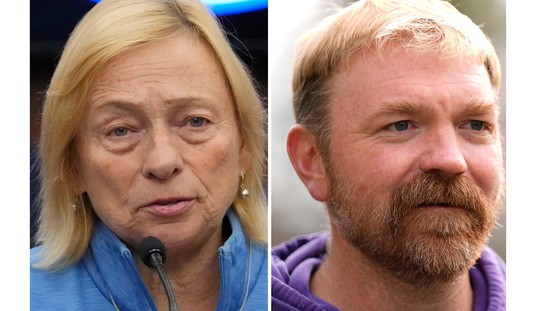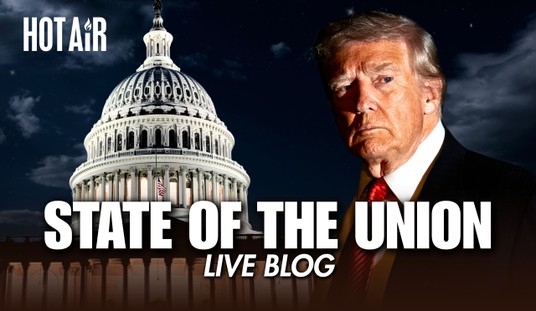I understand the politics of this — sort of, not entirely — but I don’t understand how he plans to implement it. Before we get to that, though, note that Trump has been a fan of stop-and-frisk for a long time, as many New Yorkers are. This tweet is dated 2013:
https://twitter.com/realdonaldtrump/status/352477447859617793
Giving cops more power to quiz passersby on “reasonable suspicion” that they might be up to no good is the sort of aggressive anti-crime measures voters expect from a law-and-order strongman, especially one from NYC. Many New Yorkers tolerated stop-and-frisk over the years for the simple reason that it seemed to work. Everyone’s heard of the dramatic decline of crime in the city from the early 90s to the present day; whatever the police were doing during that period was paying off, and part of what they were doing was stop-and-frisk. The left disliked the practice, though, and agitated against it because it was used disproportionately against blacks, suggesting it was driven by racial profiling. Bill de Blasio got elected mayor in 2013 partly by campaigning against it. The same year a federal court ruled it was unconstitutional. (That ruling is on appeal.) And various analyses have concluded that it’s not as effective in reducing crime as it’s cracked up to be. The recently retired NYPD commissioner, Bill Bratton, complained that stop-and-frisk had damaged the relationship between cops and black New Yorkers. Since 2013, under de Blasio, the number of police stops fell precipitously. New York CIty’s violent crime rate also continued to fall.
Even so, it’s a staple of the “tough on crime” pitch by New York Republicans, starting of course with Rudy Giuliani, Chris Christie, and now Trump. He was asked today at a townhall meeting with black voters that’ll air on Hannity’s show tonight what he’d do about black-on-black crime. His answer:
“I would do stop-and-frisk. I think you have to. We did it in New York, it worked incredibly well and you have to be proactive and, you know, you really help people sort of change their mind automatically,” Trump told the questioner. “You understand, you have to have, in my opinion, I see what’s going on here, I see what’s going on in Chicago, I think stop-and-frisk. In New York City it was so incredible, the way it worked. Now, we had a very good mayor, but New York City was incredible, the way that worked, so I think that could be one step you could do.”
Politically that makes sense. Americans are worried about rising crime, Trump’s the authority figure who’s promising to bring down the hammer on criminals, so naturally he’s going to favor stop-and-frisk. The fact that the left despises it and a court has deemed it illegal only makes the politically incorrect thrill of supporting it that much more potent. What doesn’t make as much sense, though, is that he’d push this idea to a black audience when stop-and-frisk has been derided as racist for years. Someone who attended today’s townhall (and who doesn’t care for Trump) told Reuters that she sensed a “pause” and discomfort in the room when he made his pitch on this. Democrats are going to hammer him over it now inevitably in their messaging targeting black voters. Trump had the good sense to frame this as something he’d be doing specifically to help black victims of crime from being preyed upon, but there’s a lot of hostility to the policy to overcome here. A Marist poll of New Yorkers in 2013 found 75 percent of blacks and Latinos wanted the policy overhauled; a Quinnipiac poll taken a year earlier found 69 percent of black New Yorkers disapproved of it. That doesn’t mean they’re opposed to some form of it — yet another poll found two-thirds of blacks wanted to keep the policy in New York, albeit with 60 percent wanting modifications. But this is going to drag Trump into debates about how, exactly, he’d ensure that stop-and-frisk wouldn’t be used in a racially discriminatory way. Will higher-crime white neighborhoods also be aggressively policed with stop-and-frisk, assuming he can find a constitutional way of doing it?
That’s the other question here: What does Trump mean when he says “I would do stop-and-frisk”? The only police force he’d control is the FBI. The president can’t “commandeer” local cops to carry out his schemes. He can recommend that they use stop-and-frisk, of course, but Federalism 101 is that you’re usually better off trusting the locals who know their jurisdictions well to find a proper policy solution than the federal authority in far-flung Washington who’s offering a glib one-size-fits-all solution to a complex problem. Then again, this is the same guy who suggested a few months ago that he’d mandate the death penalty in all cases where police officers have been murdered, as if there’s any reason to believe that the federal government should be setting penalties for state crimes instead of the states themselves. I don’t think he gives a moment’s thought to the question of which level of government should wield which powers and why. I think he sees himself as a national savior and reasons that a savior should have whatever power is necessary to make whatever improvements are necessary. Black-on-black crime is a major problem. Boom: National stop-and-frisk. Simple as that.








Join the conversation as a VIP Member